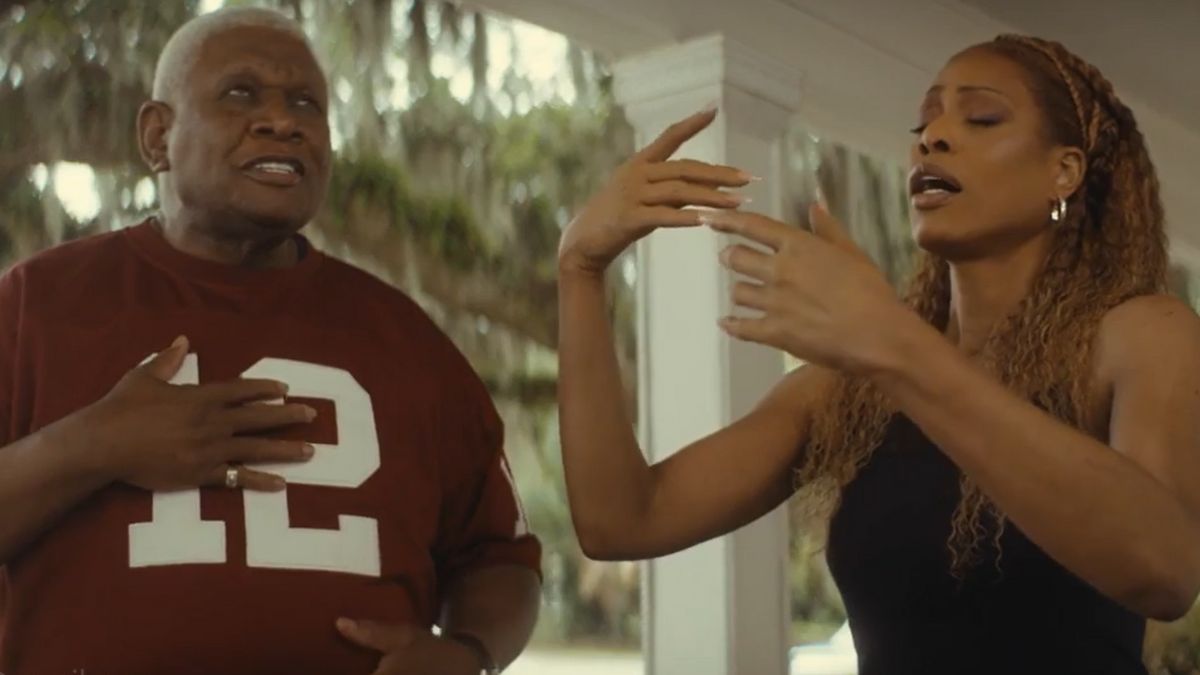In Clean Slate, Laverne Cox’s Desiree Slate returns to Mobile, Alabama to reconnect with her estranged father Harry, and collect herself after a combination career/relationship setback in New York City.
The Prime Video sitcom is one of the last that Norman Lear worked on before his passing, and subsequently opens with the following quote reflecting the legendary comedy producer’s television legacy: “The laughter I’ve enjoyed most is the laughter that has brought numbers of us together.”
More than a mere tribute to Lear, this quote serves as a thesis for Clean Slate itself. The series deploys an array of comforting and familiar sitcom tropes to explore Black trans identity, community, and allyship in the Deep South. Clean Slate‘s broad comedic approach and heartfelt ensemble package its topical and poignant subject matter into a format with mainstream appeal. The series feels tailor-made for the current political climate, reminiscent of a Lear sitcom that packed a similar punch in One Day at A Time.
Clean Slate’s Central Father-Daughter Dynamic Buffs Out Its Minor Blemishes
Desiree: “If you had seen me more, you might have seen me more.”
Harry: “Well, my eyesight ain’t gone yet.”
The strongest source of heart and humor in Clean Slate radiates from its core father/daughter narrative. George Wallace’s reactions and delivery throughout the series propel its comedy and create an important balance in Harry and Desiree’s dynamic. Much like the relationship between Rita Moreno’s Lydia and her granddaughter Elena in One Day at a Time, Clean Slate explores timely political themes without having the younger and more progressive character be depicted as constantly “in the right.” Clean Slate treats Desiree like a complete person and not a paragon, letting audiences laugh along with Harry at her eccentricities and their generational differences. The show works because both characters have an equal amount to learn from one another as they reforge their relationship.
As with One Mississippi, another Prime Video original exploring queer identity in the American South, Clean Slate embraces Desiree’s Alabama roots, setting its episodic misunderstandings against backdrops like Mardi Gras masquerades, Sunday mass, and local fairs. However, the Election Day episode “Pillars” stands out as one event that relegates Desiree and her car wash-owning father to separate plot lines. Though Clean Slate has an enjoyable ensemble of characters, episodes like “Pillars” demonstrate that the show still has room to sharpen its overall comedic voice outside of Wallace and Cox’s centripetal chemistry.
In Clean Slate‘s pilot, Desiree comments on how little has changed in her childhood home, to which Harry replies: “If it ain’t broke, don’t fix it.” Harry’s prodigal daughter proceeds to sit on a defunct recliner that flings her backward, prompting the follow-up: “That’s broke. I gotta fix it.” This blend of quick set-ups and physical gags permeates Clean Slate‘s first season, and though it doesn’t always yield laugh-out-loud results, there’s an inherent charm that often extends from delivery and strong characterization.
Episode 2’s “Pronoun Jar,” a clever evolution of New Girl‘s “Douche Jar,” is one of the series’ most delightful bits. Instead of developing that particular set piece into a running gag and detracting from Harry’s progress, Clean Slate establishes a more subtle background runner with the church’s evolving marquees. Seemingly throw-away jokes about characters’ backgrounds often pay off in clever ways later on, such as Miguel’s Dungeons & Dragons night or the reveal as to why Harry’s favorite restaurant seems to feature a glaring misspelling on their menu.
Clean Slate Deserves a Second Act

Audiences were first introduced to Cox at the dawn of the streaming era in Netflix’s Orange is the New Black. Though she was one of the Netflix prison drama’s biggest breakout stars and has spun her success into many subsequent film and television roles, I’ve longed to see Cox in a starring role like Clean Slate. While the Prime series finally puts Cox in the driver’s seat (both figuratively and literally in Episode 6) as lead, executive producer, and co-creator, I fear that the oversaturation the streaming market has experienced since Orange is the New Black won’t yield Clean Slate the viewership it so sorely deserves.
Despite the rougher edges of Clean Slate‘s first season, it carries that same potential and potency of a show like Parks & Recreation, which was granted the leeway to find its voice and audience and flourish into a sitcom with a beloved legacy. Now more than ever, I want to live in a world where Clean Slate is granted that opportunity to fully capitalize on Lear’s ambition of the laughter that brings a number of us together. However, it’s difficult to harbor that hope as a comedy fan who has had to watch the flames of streaming exclusive shows like Our Flag Means Death, Primo, How to Die Alone, Los Espookys, and Rutherford Falls extinguished before their time.
Clean Slate neatly sets up the hook for its potential second season in the finale’s closing act. Here’s hoping the series reaches an audience that needs it and loves it and, most importantly, can bring Desiree and Harry back for a return trip through the car wash.
Clean Slate is streaming now on Prime Video.
